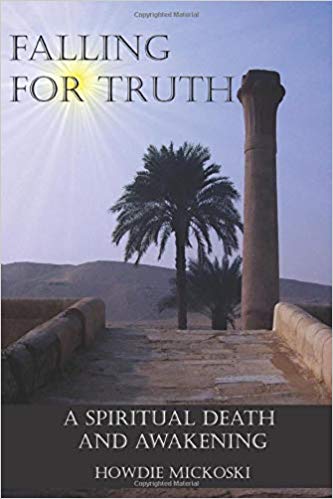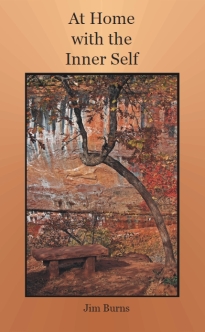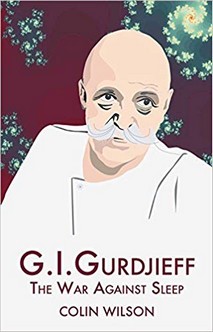TAT Forum
January 2020
Homing Ground Update… A spot on earth where people can do retreats and hold
|
Receive new-Forum notifications each month
Let your voice be heard
Enjoy the benefits of TAT membership
Become a TAT member
Help support TAT;
become a member today
|
As an Amazon Associate, TAT earns from qualifying purchases made through links on our website. |

Convictions & Concerns
TAT members share their personal convictions and/or concerns
Realization
After being introduced to the search for Truth within by Richard Rose in the fall of 1972, my questions were answered 46+ years later, April 7, 2019, during a rapport sitting with friends at the TAT Foundation meeting.
As a college freshman, I held the belief that the truth was to be found in science and that fundamental paradoxes in physics could be resolved by knowledge of first principles. After meeting Richard Rose in the fall of 1972, my search for Truth quickly turned to a search within for answers.
Working increasingly closely with my friends on the path and Rose during the ensuing 4 years of college and several years after, I found "rapport sessions" to be times of insight. Rose encouraged sitting silently with other seekers with whom one has a feeling of rapport, and then feeling for others' minds without focusing on self or on others, feeling for what is "between." Rose wrote about this topic in his book, Energy Transmutation, Between-ness and Transmission. He also believed that such rapport sessions could prepare the mind of the seeker for Transmission. Between-ness opens the mind to Grace.
Three and a half years into the search, in the Spring of 1976, a partial realization occurred unexpectedly and simultaneously to me and a friend (Dan P.) with whom I had sat in rapport almost weekly for several years. Following intense contemplation of something Richard Rose had said, we began a silent rapport sitting with others. At the end of the sitting we were suddenly and instantaneously Aware, immersed in singular, undifferentiated Awareness wherein no-thing and no person is present. Only Awareness. He knew that I knew, and I knew that he knew. Aware as one, we witnessed in the periphery a roiling dimension of thought—all that ever is or ever will be, present in a roiling dimension of thought, all present at once.
The immersion in singular, undifferentiated Awareness lasted perhaps twenty minutes, until a thought attracted curiosity and attention, whereupon our minds instantaneously separated. In the ensuing twenty minutes we sat astonished, observing thoughts, feelings and emotions passing back and forth between our minds, the source of which was unclear. We were watching life unfold in the mind dimension as we slowly returned to identification with the world experienced by our separate minds. The phenomena of ESP are trivial by comparison.
I found similarity in Ramana Maharshi's description of Kevala Nirvikalpa Samadhi, and his analogy of the bucket being lowered into the well and back out again. The bucket—the mind—holding onto its identity while being fully immersed in Awareness.
For many years, my immature mind held onto its identity, believing that it had "experienced" Awareness. Despite what was witnessed, the mind believed the relative mind was real, had an "experience," and returned to reality. But this is exactly backwards….
 See the complete essay.
See the complete essay.
*
~ Thanks to Richard Rose student and long-time active TAT member Mike Gegenheimer for this November 2019 description of his April 2019 revelation.

Would you like to share your impressions or questions with other TAT Forum readers? Please email your comments to the .


TAT Foundation News
It's all about "ladder work" – helping and being helped
|
TAT Press's latest publication….
What are you impressions of Falling for the Truth?
|
* April 3-5, 2020 *
June 12-14, 2020
August 14-16, 2020
November 6-8, 2020
 April TAT meeting details will be coming well before April
April TAT meeting details will be coming well before April
2020 TAT Gatherings will be in our New Home!
 The following video recordings of presentations from a previous April TAT meeting are available on YouTube:
The following video recordings of presentations from a previous April TAT meeting are available on YouTube:

 Richard Rose spent his life searching for the Truth, finding it, and teaching others to find their Way. Although not well known to the public, he touched the lives of thousands of spiritual seekers through his books and lectures and through personal contacts with local study groups that continue to work with his teachings today. Meet Richard Rose is a 34-minute audio recording of an audiovisual presentation by Michael Whitely at the August 2017 TAT meeting that explores the arc of Richard Rose's life as seeker, finder, family man, and teacher.
Richard Rose spent his life searching for the Truth, finding it, and teaching others to find their Way. Although not well known to the public, he touched the lives of thousands of spiritual seekers through his books and lectures and through personal contacts with local study groups that continue to work with his teachings today. Meet Richard Rose is a 34-minute audio recording of an audiovisual presentation by Michael Whitely at the August 2017 TAT meeting that explores the arc of Richard Rose's life as seeker, finder, family man, and teacher.
 Downloadable/rental versions of the Mister Rose video and of April TAT talks
Remembering Your True Desire (details).
Downloadable/rental versions of the Mister Rose video and of April TAT talks
Remembering Your True Desire (details).
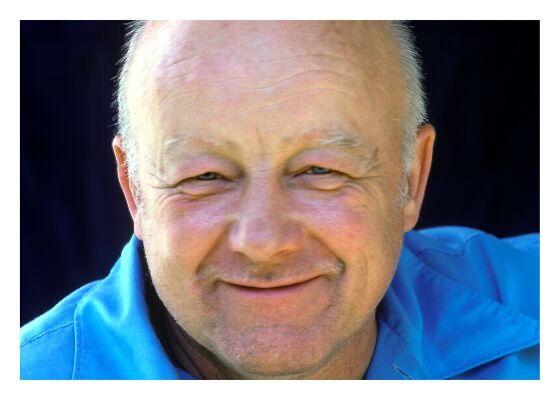
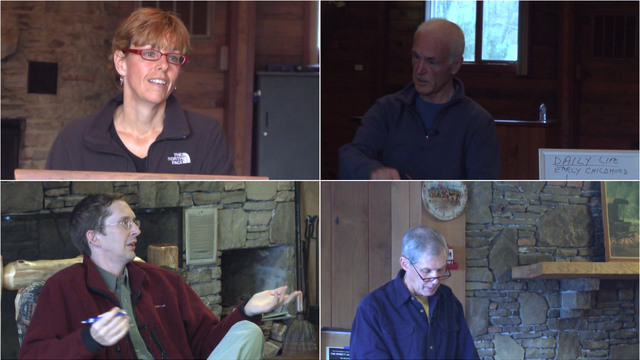
Local Group News

 Update from the Central New Jersey Group:
Update from the Central New Jersey Group:
The Central Jersey Self Inquiry Group has been meeting 2 times per month since our first meeting in early January this year. We have been averaging 5 participants at each meeting. Current outreach is our meetup.com page (above link) and word of mouth. Our most recent meeting topic was: "What is your biggest obstacle?"
~ Email
for more details.

 Update from the Central Ohio Non-Duality Group:
Update from the Central Ohio Non-Duality Group:
The Columbus group operated under the name OSU Self-Inquiry Group and met for many years in a church next to The Ohio State University. After attendance dropped off, the venue was changed to a local Panera restaurant, and the name changed to Central Ohio Non-Duality Group. The group has exposure to seekers through Meetup, but has only occasional visitors outside a core group of 4 people.
Due to schedules, we have met infrequently the past semester, and in deference to an effort to try to do other things, like rapport sittings, in private meetings.
Meeting format is a discussion format on topics of interest to seekers, and often bridges from the concerns, questions and interests of the core members in attendance into the topic which we intend to discuss.
We continue to meet on Monday evenings at Panera across from The Ohio State University.
~ For further information, contact
or
.
We're also on Facebook.

 A new self-inquiry group is forming in Dublin, Ireland:
A new self-inquiry group is forming in Dublin, Ireland:
We will meet in Dublin City, location to be confirmed. We already have two people so technically I guess we already have a group :-) but it would be great if we can get some more people involved. Meetings will take varying formats e.g. confrontation, reviewing TAT material and Rose teachings for discussion, etc.
~ Contact
for more information.

 Update from the email self-inquiry groups:
Update from the email self-inquiry groups:
An update on the women's self-inquiry group from Anima:
The Women's Online Confrontation (WOC) group consists of weekly reports where participants can include:
> What is on your mind?
> Any projects that you want to be held accountable for?
> Responses to a selected excerpt (in the previous report).
> Comments/responses/questions for other participants.
A philosophical/spiritual excerpt with two or three questions is included in each report.
Based on what we share, participants ask questions to help get clarity about our thinking.
The intention is to help each other see our underlying beliefs about who we are.
One rule we try to adhere to is not to give advice or solve problems.
The number of participants, to make it work efficiently, is between 4 and 7 including the leader.
Both the women's and the men's weekly email groups are active and welcome serious participants. ~ Contact or for more information.

 Update from the Gainesville, FL self-inquiry group:
Update from the Gainesville, FL self-inquiry group:
We continue to meet at the Alachua County library on alternate Sundays.
~ Email
or
for more information.
|
The Gainesville self-inquiry group is planning a
four-day intensive retreat at Horseshoe Lake Park in Citra, FL on Friday-Tuesday, Feb. 28–Mar. 3.
The theme will be "Modern Day Mystics."
|

 Update from Galway, Ireland:
Update from Galway, Ireland:
Tess Hughes is currently working with seekers one-to-one and holding occasional group self-inquiry retreats.
Anyone who's interested in self-inquiry activity in Ireland is welcome to
contact
.
 TAT Press publishes Tess's easy to read, profound This Above All, the story of her journey of Self-Discovery.
TAT Press publishes Tess's easy to read, profound This Above All, the story of her journey of Self-Discovery.
 This is a new listing for the self-inquiry group in Goldsboro, NC:
This is a new listing for the self-inquiry group in Goldsboro, NC:
The Goldsboro Inquiry Group (GIG) meets on the first and third Monday evenings of the month. We begin the meeting with a short reading, then sit in silence for 20 minutes before opening it up to what I like to call group assisted self inquiry.
~ For details on when and where, contact
.
 Update from the Greensburg, PA self-inquiry group:
Update from the Greensburg, PA self-inquiry group:
The Greensburg Self-Inquiry Group is still in hiatus. I do plan to start it up again at some point as I see it as a lifeline to my own spiritual path. Things got stale with my group's participants, but I will e-mail them at some point to schedule another SIG meeting. In the meantime, I participate in a local "Socrates Cafe" group at the coffee house/art gallery where I have had my meetings. This group is not into esoteric philosophy as such, but they're supposed to be into "Socratic Inquiry," and I figure it's better than not engaging in any discussions with people. At least we sometimes touch upon spiritual matters, and this makes attending their meetings worthwhile.
~ Contact
if interested in local self-inquiry meetings.

 A new self-inquiry group is forming in Hartland, VT:
A new self-inquiry group is forming in Hartland, VT:
Located in central Vermont, along I-91, the group will be using TAT videos from past conferences as a primer for discussion.
~ Contact
for more information.

 "Ignoramuses Anonymous" blog
"Ignoramuses Anonymous" blog
Ignoramuses Anonymous is for seekers to explore questions together…a fellowship of seekers for whom ignorance of the absolute truth had become a major problem. It started as a blog for Pittsburgh PSI meeting members back in 2009. Welcoming discussion on the path.
To get notices of new posts, you can subscribe by RSS feed or by
email.
From the Nov. 17th post:
William Samuel recommends adding glimpses to your journal, and I've been doing that for about half a year when I review the day. If I haven't had a glimpse I write down something I appreciate…or can appreciate. But what is a glimpse?
|
|

 Update from the New York City self-inquiry group:
Update from the New York City self-inquiry group:
Our goal is to investigate and confront our unexamined beliefs in a group dynamic within a safe environment. We aim to serve as mirrors for each other, to see ourselves more clearly.
Topics range from the psychological ("What kind of people annoy you?") to the abstract ("What is the nature of perception?").
We have meetings every Monday at 180 Maiden Lane from 6-8 PM. We welcome any new members who are interested in self-inquiry.
~ If interested please reach out to
or find out more through our Meetup link above.
 Update from the Pittsburgh, PA self-inquiry group:
Update from the Pittsburgh, PA self-inquiry group:
We meet on the 1st & 3rd Wednesdays of each month, 7-9 PM, at the Friends Meeting House in Oakland (4836 Ellsworth Ave, PGH 15213).
We also meet informally on the 2nd & 4th Wednesday of each month at Panera Restaurant in Oakland, 3401 Blvd Of The Allies, Pittsburgh, PA 15213, 7-9 PM. "Bring your own topic," get some coffee, and look for the table with a green raincoat on the back of a chair in order to find us!
Last month's topics were:
Wed, Dec 4: Eckhart Tolle "What a liberation to realize that the voice in my head is not who I am! Who am I then? The one who sees that! The awareness that is prior to thought…."
Wed, Dec 18: Ramana Maharshi "The body does not say 'I am,' it is you who says 'I am the body.' Find out who this 'I' is. In seeking its source it will vanish."
~ For further information, contact
or
.

 Update from the Portland, OR self-inquiry group:
Update from the Portland, OR self-inquiry group:
A small group of us meet most Sundays at a coffee shop. The format for our meetings is to give each person 20 minutes or so to talk about whatever is coming up for them in their practice and to answer questions from the others.
~ Email
for more information.
|
|

 Update from the Richmond Self Inquiry Group:
Update from the Richmond Self Inquiry Group:
The Richmond Self Inquiry Group has been off to a slow start, and is still seeking consistent participants. Once a small steady group is formed, this often attracts more interest and things evolve from there. The Meetup group is private, which aims to foster the creation of a committed gathering of individuals. Clearly there is a potential downside to this as it limits visibility and exposure to potentially interested persons.
For those reading about the group here through the TAT Forum, please know that you can certainly attend without being a member of the Meetup group, just shoot me an email any time if you're in the area and we can communicate about future meetups.~ Email
for information about upcoming meetings and events.

 Update from the Rockville, MD self-inquiry group:
Update from the Rockville, MD self-inquiry group:
We've switched to meeting weekly, Wednesday evenings, whether or not a "quorum" of three can make it. The Rockville, MD public library rooms can be reserved exactly 6 days and 12 hours before a meeting's end time, so it's been a challenge to get a consistent room among the five available, but it's a consistent group and the walls are glass—so, so far, figuring out the room hasn't been an issue.
~ Contact
for more information.
 Update from the San Francisco Bay area self-inquiry group:
Update from the San Francisco Bay area self-inquiry group:
See the Shawn Nevins interview by Iain McNay of Conscious.tv, kicking off the publication of Shawn's book Subtraction: The Simple Math of Enlightenment.
~ Email
for information about upcoming meetings and events.
Members-Only Area
A password-protected section of the website is available for TAT members. The area contains information on product discounts for members as well as a substantial amount of helpful and historical information, including audio recordings, Newsletter archives, Retrospect archives, policies, conference proceedings, business meeting notes, photographs, and suggestions for ways to help.
 TAT's August 2019 Workshop was titled Beyond Mindfulness: Meditation and the Path Within and included three guest speakers who each led separate workshops. The following audio recordings are now available in the members-only website area:
TAT's August 2019 Workshop was titled Beyond Mindfulness: Meditation and the Path Within and included three guest speakers who each led separate workshops. The following audio recordings are now available in the members-only website area:
- "Mindfulness. Is it just another spiritual buzzword?" with Bob Cergol,
- "The Path of Direct Sensory Perception" with Bob Harwood, and
- "The Art of Mindfulness is the Passion for Truth" with Paul Rezendes.
 TAT's June 2019 Spiritual Retreat Weekend was titled Between You and the Infinite. The following audio recordings are now available in the members-only website area:
TAT's June 2019 Spiritual Retreat Weekend was titled Between You and the Infinite. The following audio recordings are now available in the members-only website area:
- "Coming Home (aka The End of Seeking)" by Don Oakley, and
- "What's in the Way?" by Eshwar Segobind.
 TAT's April 2019 Spiritual Retreat Weekend was titled Once in a Lifetime is Now. The following audio recordings are now available in the members-only website area:
TAT's April 2019 Spiritual Retreat Weekend was titled Once in a Lifetime is Now. The following audio recordings are now available in the members-only website area:
- "Recognizing the Human Dilemma" by Norio Kushi,
- "Strategies for Self-Realization" by Bart Marshall,
- Untitled session by Paul Hedderman, and
- "A Session in the Now" by Paul Rezendes.
 TAT's August 2018 Workshop was titled Beyond Imagination and included three guest speakers who each led separate workshops. The following audio recordings are now available in the members-only website area:
TAT's August 2018 Workshop was titled Beyond Imagination and included three guest speakers who each led separate workshops. The following audio recordings are now available in the members-only website area:
- "Nurturing What We Are" with Jenny Clarke,
- "The Art of Seeing" with Norio Kushi, and
- "Seeing Through Imaginary Traps" with Shawn Pethel.
Please us if you have questions. (Look here for info on TAT membership.)
Amazon and eBay
|
As an Amazon Associate TAT earns from qualifying purchases made through links on our website. TAT has registered with the eBay Giving Works program. You can list an item there and select TAT to receive a portion of your sale. Or if you use the link and donate 100% of the proceeds to TAT, you won't pay any seller fees when an item sells and eBay will transfer all the funds to TAT for you. Check out our Giving Works page on eBay. Click on the "For sellers" link on the left side of that page for details. |
Your Contributions to TAT News
TAT founder Richard Rose believed that working with others accelerates our retreat from untruth. He also felt that such efforts were most effective when applied with discernment, meaning working with others on the rungs of the ladder closest to our own. The TAT News section is for TAT members to communicate about work they've been doing with or for other members and friends. Please your "ladder work" news.

Humor
"One thing you must be able to do in the midst
of any experience is laugh. And experience
should show you that it isn't real, that it's a
movie. Life doesn't take you seriously, so why
take it seriously." ~ Richard Rose, Carillon
|
Stairway to Heaven
~ Thanks to two TAT members who liked this.
|
|
Self-reflection, of course, is when you put a slice of your life under the microscope, focus it in, and observer it carefully. Then you stand back and try to avoid projectile vomit.
Everyone has this emptiness, but some of us have it more than others. It's called being spiritually horny.
After visiting America for a while, it's always nice to get back to New York. [City, of course, when returning from a funeral in Cleveland -Ed.]
|

Which Way Should I Go?
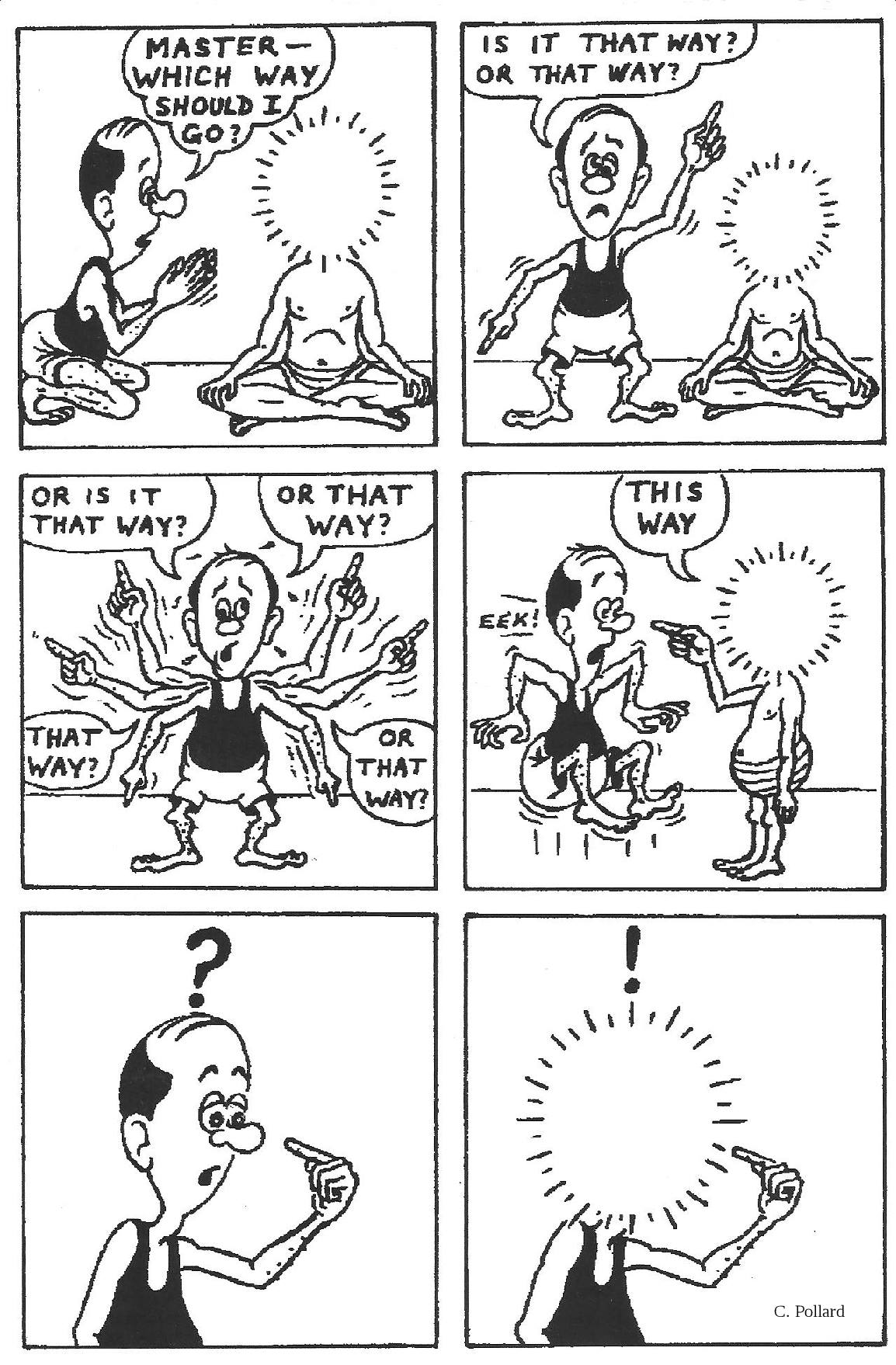
~ Thanks to TAT member RC. © C. Pollard.

 We're hoping to present more humor from TAT members and friends here. Please
your written or graphic creations. Exact sources are necessary for other submissions, since we need to make sure they're either in the public domain or that we have permission to use them.
We're hoping to present more humor from TAT members and friends here. Please
your written or graphic creations. Exact sources are necessary for other submissions, since we need to make sure they're either in the public domain or that we have permission to use them.

Inspiration & Irritation
Irritation moves us; inspiration provides a direction
|
Desire to Be Reabsorbed
[My friend] described to me the strange "timeless" mood in her mother's house with all of them there, while her mother lay in bed dying. The proximity of death is like an enzyme that thins the boundaries. In this condition individuals rush together to embrace each other, to embrace that which unites us all. and suggesting the above image to accompany it. |

|
* ~ Thanks to TAT friend Tim H. for this quote from At Home with the Inner Self by Jim Burns. |

|
Desperado, why don't you come to your senses?
Know the queen of hearts is always your best bet.
Desperado, oh, you ain't gettin' no younger,
Your prison is walking,
You better let somebody love you, * ~ Thanks to TAT member Brett S. |

|
It was in 1951, a year after the publication of In Search of the Miraculous and Beelzebub's Tales to his Grandson, that I first came across the ideas of Gurdjieff. I was instantly aware of being in touch with one of the great minds of this century. I wrote about him for the first time in 1955, in the concluding chapter of The Outsider, where he figures (with Ramakrishna and T.E. Hulme) as one of the few men who have glimpsed the solution to the 'sickness of man in the twentieth century'…. Gurdjieff was, in fact, a kind of magician. There can be no doubt that he possessed certain magical or psychic powers. But he seems to have regarded them as irrelevant or unimportant. Gurdjieff's central concern was the potentialities of human beings—or, more specifically, of human consciousness. Ouspensky expressed it clearly in a little book called The Psychology of Man's Possible Evolution, where he remarks that ordinary psychology is concerned with man as he actually exists. But there is another kind, that 'studies man not from the point of view of what he is, but from the point of view of what he may become; that is, from the point of view of his possible evolution'. * ~ From G.I. Gurdjieff: The War Against Sleep, by Colin Wilson. |

Please
your thoughts on the above items.

Reader Commentary
Encouraging interactive readership among TAT members and friends
|
A reader wrote that what would make the Forum more interesting would be: Hearing from people who are searching – and have questions instead of those providing endless advice and "answers." What challenges they are facing. What their doubts and questions are. How they perceive their path is going. What they are doing in their lives. Where they think they will end up. Etc. etc. Can you help make the Forum more interesting? |
 The Reader Commentary question for the January Forum:
The Reader Commentary question for the January Forum:
What are you impressions of Falling for Truth by Howdie Mickoski? Or, if you don't have the book, of Chapter 1?

 From Colm H:
From Colm H:
I don't have the book so clicked on the link to read the first chapter. My impressions are that it is well written and would be a good read. I like the early context setting from the personal point of view, the snapshot of his Awakening in the river in the canyon coupled with the ideas that most modern spirituality / religion is designed to keep people asleep, which is very direct and to the point. His expansion into it being hard to find the real deal, and that many wouldn't be interested in it anyway, is also well communicated. There are clear tinges of humor, too, which are enjoyable to read. The references to linking Rose and other teachings back to ancient wisdom sounds very interesting; I would be fascinated to read more about that. Overall, the chapter was a good read, so I will likely get the book to read the rest of it.
 From Brett S:
From Brett S:
Chapter 1 of Howdie Mickoski's Falling for Truth introduces us to an author earnestly trying to convey an experience of ego-death without pretension, sharing lessons from teachers that inspire him, and expressing a frustration with modern spiritually that he thinks misses the whole point. Richard Rose is known for railing against hucksters and charlatan spiritual teachers. Likewise, Howdie isn't afraid to call-out insincere spiritual seekers. "No one is really going within, just playing a game of pretend happiness staring at their iPhone," he writes. The author sets up his story of spiritual realization/ego death by placing us simultaneously at the scene of a near-death experience in a canyon and also at the back-and-forth banter he has with his book editor, as he tries to explain what about that moment in the canyon indelibly changed his experience of becoming one's very self. In a short span, the book's references to various spiritual philosophies personally investigated by the author tees up his take on why "the only real teacher or helper that we ever learn to trust is ourself."
 From Isaac H:
From Isaac H:
I have only read the first chapter, but that was enough to make me want to get the full book at the next TAT meeting (I prefer not to shop from Amazon). Howdie's writing is genuine and creative, and his unique, eclectic spiritual search seems like a story well worth absorbing.
 From David L:
From David L:
In this book, Howdie Mickoski combines personal experience, psychological insight, honesty in working through his own blocks and shortcomings, and a good command of history and mysticism into a very readable book. It's exceptionally good for understanding nondual perspectives on different kinds of groups and practices. It bogs down for a while with a technical discussion around Richard Rose's Jacobs-ladder triangles and Egyptology, but that can be skipped over easily enough. A good read for sure!
 From Anonymous:
From Anonymous:
Howdie Mickoski's book is a wild read.
It's really more of a workbook, long, covering many bases, sometimes disconnected, but certainly a rewarding read for anyone interested in what other seekers do, find, believe, experience (and sometimes preach) on their path. This is his personal slant on some of the highest teachings, the arcane, his own experiences (and sometimes speculation) that he strings together to form his own Mickoski philosophy on death—and it's sure to stir the reader.
The book opens with a description of his personal Awakening experience as an authoritative credential. The first four chapters followed, a somewhat condemning but well thought-out argument about the current state of spiritual movements in general—an excellent challenge for anyone who believes they are on the "right" path. That led to a separate section with his interpretation of different teachings and systems unified into one, drawing connections between pyramids, triangulation, ancient philosophies, energy and human development. He drew mainly and frequently from passages from Richard Rose's Psychology of the Observer and his lectures, also from the Gnostics, Carlos Castaneda, Zen, and Alchemical Hermetic traditions. However, I must say that I browsed quickly thus far, even fading off with so much conceptualization, until a single statement of his jumped out at me: an admission that although he considered himself Awakened, he had not gone the whole way "to the Absolute." This was the first time I had ever heard an awakened teacher of any caliber make that admission, and in that moment of honesty and unexpected humility, he gained my respect as a seeker whose story was worth my attention and valuable as a path with which to compare my own. The last section was a collection of esoteric topics where his enthusiasm as a seeker really shined, and I got another insight that this was a guy that would pursue his curiosity and gut feelings relentlessly and as an honest seeker to find the truth of the matter at hand—not that I would follow him in those directions but admired his pursuit of ancient artifacts and wisdom for alternative paths of thinking and seeking.
The entire book has a heavy underlying theme of Richard Rose's thinking. Howdie often has some unusual interpretations that I don't believe were necessarily intended by Rose, but they are his personal, honest and also useful interpretations. I did wonder about an Awakened person's concern for "a functioning ecosystem and environment," but I do respect it. I also wondered about overlooking some important topics such as Rose's concepts of the vector, becoming and between-ness. A quick word search also confirmed a big disappointment for me: no serious concern for developing intuition, the heart, love or more about this thing called surrender.
Finally, an honest note from a grateful reader to the author: it's on page 143 of Psychology of the Observer: "The shortest way to a man's head is through his heart" as an attempt to reach the reader's or listener's intuition.
 From Tara S:
From Tara S:
In Falling for Truth the author describes personal experiences throughout his spiritual search, most notably an accident in which he states that he faced death, and discusses teachings, especially those of Richard Rose, which he encountered along the way. At first, I found Falling for Truth engaging due to the subject matter but also entertaining because, unlike most spiritual literature, it reads like a story with a humorous edge that includes fun interactions with his editor. A rather lofty undertaking that touches upon a vast amount of material, it serves to expose readers to a myriad of concepts. Newcomers to this arena may find the book very useful but in the last chapter the author implies the book may be best suited for a select audience, "second pyramid" folks [a reference to Richard Rose teachings]. As a student of Rose's work, I felt at home with the book's content, am familiar with its sometimes specialized language, and most of the ideas in Falling for Truth ring true for me (e.g., the assertion that the main attributes required to become a "spiritual warrior" are honesty, courage and commitment).
By Chapter Two, I had become bewildered and frustrated by the lack of care regarding grammatical and typographical errors. I resisted constant editing in order to get through it. This sends a message (at least to me) that the author doesn't value his work enough to get the logistics of good writing hammered out before allowing it to go to print. I doubt the author doesn't care about the quality of his work but, seriously… the last line of the FIRST PARAGRAPH of acknowledgements, in his statement to Shawn Nevins, the word "go" was left out, which was necessary for a logical sentence. Ironically, the paragraph is about how Shawn tried for 4 years to show the author how to make his manuscript acceptable. (It made me wonder if that deletion was intentional.) Was the book written using voice recognition that didn't register correctly? Regardless, the book is laden with misprints, incorrect punctuation, poor grammar and other literary embarrassments. When considering the intelligent, well-read audience likely to be drawn to this sort of book, I can't imagine why this was allowed to happen. Correcting these errors would be relatively simple, making it acceptable (and respectful) to its audience. Otherwise, this book has the potential to be a highly worthwhile offering in the genre. So I pressed on, trying to look past the writing issues and attempting to focus on content.
Falling for Truth has many positive attributes. There are classic, thought-provoking quotes from a wide variety of sources, and the book covers an array of topics not typically presented in more widely-circulated spiritual literature. I enjoyed the direct approach; while encouraging skepticism of teachers that charge a lot and have a gimmick, the author spills it out and spells it out, without guile. "Most spiritual people do not have enough courage and honesty to examine their garbage." I also like the spiral/labyrinth analogy which proposes there are two parts to awakening: going in and back out… "Totality of the Self is not found in the center of a labyrinth." In Chapter Four, many of Richard Rose's core concepts are presented, such as Jacob's Ladder, the umpire, the process observer, backing away from untruth, and between-ness. Overall, the author offers clear descriptions of Rose's teachings with no sugar coating. And the book is full of gems by the author like, being "vaccinated for death" and "the more one dies before one dies (or drops what one believes to be themselves) the less there is to die at the end." Other good topics explored include: Thought, "what's watching thought," the reference point of "me," how a child learns (is brainwashed into) the idea of "I" and the development of beliefs. Emphasis is placed on the importance of commitment, turning within when the outer world has failed and embracing honesty: "Our walking must be individual—the path we actually require—as opposed to the one we wish to have." I'm convinced.
In spite of much to recommend it, perhaps the second biggest obstacle to this being a really good book (after the writing errors) is that too much ground is being covered. Presenting so many topics, from the New Age movement to Ancient Egypt, holograms to invisible entities and on and on, may just be too much for one volume. In Chapter Six, referring to "Native Indians and Aboriginals" as religions, alongside Hinduism and Buddhism, borders on being politically incorrect, but I do not think it was intentional. The author seems sincere and dedicated having spent many years as a committed seeker. The stories he tells and the questions he poses are outstanding. Much of the book is well-written, but there's a strange, almost schizophrenic incongruity: consecutive pages where the author shows he can write very well followed by sections with large numbers of typos or blatant grammatical errors. I found myself wondering if two people had written it.
At times Falling for Truth is "guide book-like" and could lead one to assume the author "knows the way." Specific symptoms characteristic of awakening are mentioned, such as physical cleansing and insomnia, yet the author freely admits he is not enlightened ("…someone who has finished. That someone is not me." p. 95), so how does he know these are typical? The book is loaded with wisdom and great hypotheses, but claims are made throughout the book as statements of fact without firsthand knowing. How does he know if he hasn't gone all the way? What authority equips him to make these statements with certainty? The book contains insights and observations by many teachers, as well as by the author himself, and often he either ascribes the insight to another source or makes it known that it is conjecture. Then the continuity is destroyed with statements like, "Nothing is random" (p. 213), which I suspect is true, but I must quote Mr. Rose: "What do you know for sure?" There are numerous other contradictions: tiered stages presented in ways that one might conclude spiritual awakening is progressive even though the author states it is not. And comparing his "potential" three books (two written, the third pending) to the three pyramids of Jacob's Ladder seems a bit of a stretch.
In conclusion, applause for the final, incredibly honest, messages: (1) The search for Truth involves commitment and action (one has to actually DO something) and, (2) "Finding Truth may or may not make one feel better." My suggestion to the author: Get it off the market, read the book aloud, slowly, with someone else who also knows how to write and attend to details. Leave the content alone. It's good. And if it takes one more year: so what? This book is a storehouse of valuable information for seekers of Truth coupled with personal accounts that may be useful to those who might not know what they're looking for or how to look for it.

|
Next Month: The stage manager in Our Town says of the recently deceased, "They're waiting for somethin' that they feel is comin'…waitin' for the 'earth' part of 'em to burn itself out and the eternal part to come out in them clear…." "Our earthly identity is all that is separating us from God—and it is the thinnest of veils, a manufactured fiction, which we cling to as if not only our existence, but the existence of God himself, depended on it." ~ Bob Cergol, "The Life Behind Things." Is there something "way down deep that's eternal about every human being," as the stage manager in Wilder's play also says? If your answer is "yes," how do you get to it? Ideas on "how" in an email exchange between two friends on the path:
From Leesa W:
From Michael R:
* The Reader Commentary question for the February Forum: Is there something "way down deep that's eternal about every human being," as the stage manager in Wilder's play says? If your answer is "yes," how do you get to it? Please your responses by the 25th of January and indicate your preferred identification (the default is your first name and the initial letter of your last name). |

Q:
What are your thoughts on this month's reader commentary? Please
your feedback.

 Richard Rose described a spiritual path as living one's life
aimed at finding the meaning of that life.
Did you find anything relevant to your life or search in this month's TAT Forum?
Richard Rose described a spiritual path as living one's life
aimed at finding the meaning of that life.
Did you find anything relevant to your life or search in this month's TAT Forum?

Rishikesh, on the Ganges River. Photo by Anima Pundeer.

We like hearing from you! Please
your comments, suggestions, inquiries, and submissions.
 Sign up for notices of TAT's four annual events and free
monthly Forums by email on our .
Sign up for notices of TAT's four annual events and free
monthly Forums by email on our .

Founder's Wisdom
Richard Rose (1917-2005) established the TAT Foundation
in 1973 to encourage people to work together on what
he considered to be the "grand project" of spiritual work.
Richard Rose Quotes
Developing the Intuition and Reason
A Prelude
A.P. (p. 207): A true seeker is a very unique person. Outwardly he will not appear to be different from anyone else. His uniqueness comes from the particular game that he plays. He allows himself to become addicted or to become a vector, -- once the idea of being a vector makes sense to him. He is like an eccentric deep sea diver who has experienced the rapture of the deep. He needs no motive to live, except to live to continue the pursuit that seems to hold the most promise.
The enlightened man has nothing to live for (by most people's standards), and yet he continues to live. Everyone else seems to have something to live for, but they are always ultimately disappointed. The seeker gradually grows indifferent to the objects of his appetites, continues to move, even though those objects are the only motivation for other people.
Why?
DMX (p. 79): Before you get into too much of this business of a reverse vector you have to develop an intuition, or you will not know how to decide that which is absurd.
Basically we have to develop our intuition and our reason.
Because this process is basically the sharpening-up of a computer. Giving the computer two important faculties, developing these faculties, and then keeping a problem in that computer incessantly….
 See the complete collection of Richard Rose quotes on "Developing Intuition and Reason"
See the complete collection of Richard Rose quotes on "Developing Intuition and Reason"

Homing Ground Update… A spot on earth where people can do retreats and hold
|
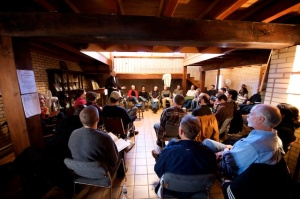
Did you enjoy the Forum? Then buy the book!
Beyond Mind, Beyond Death is available at Amazon.com.




